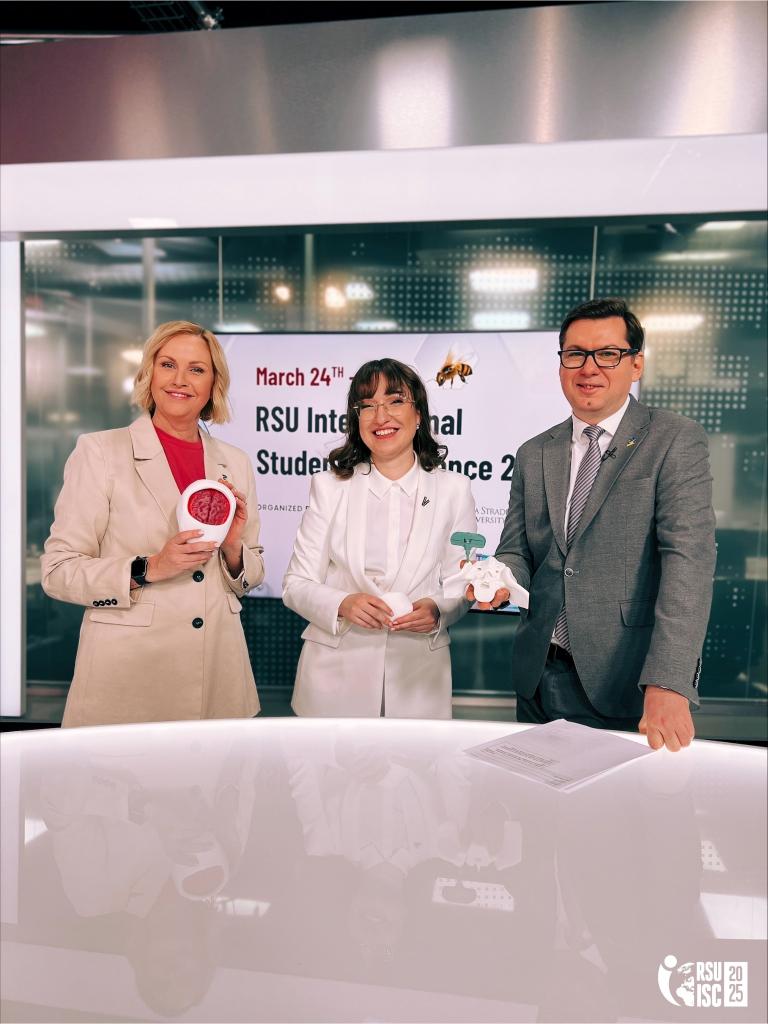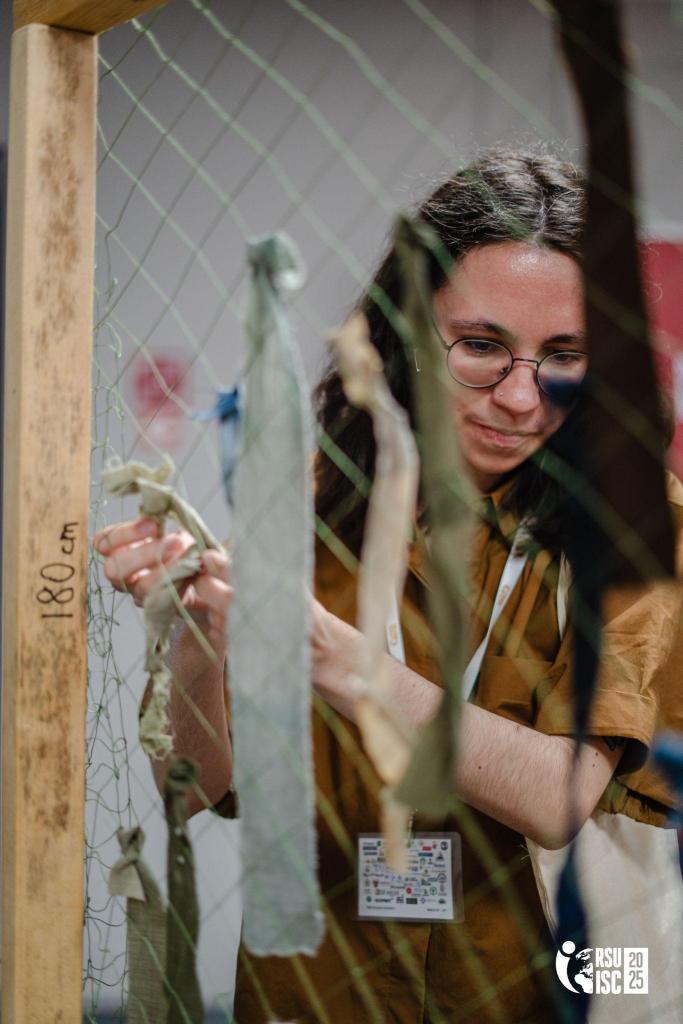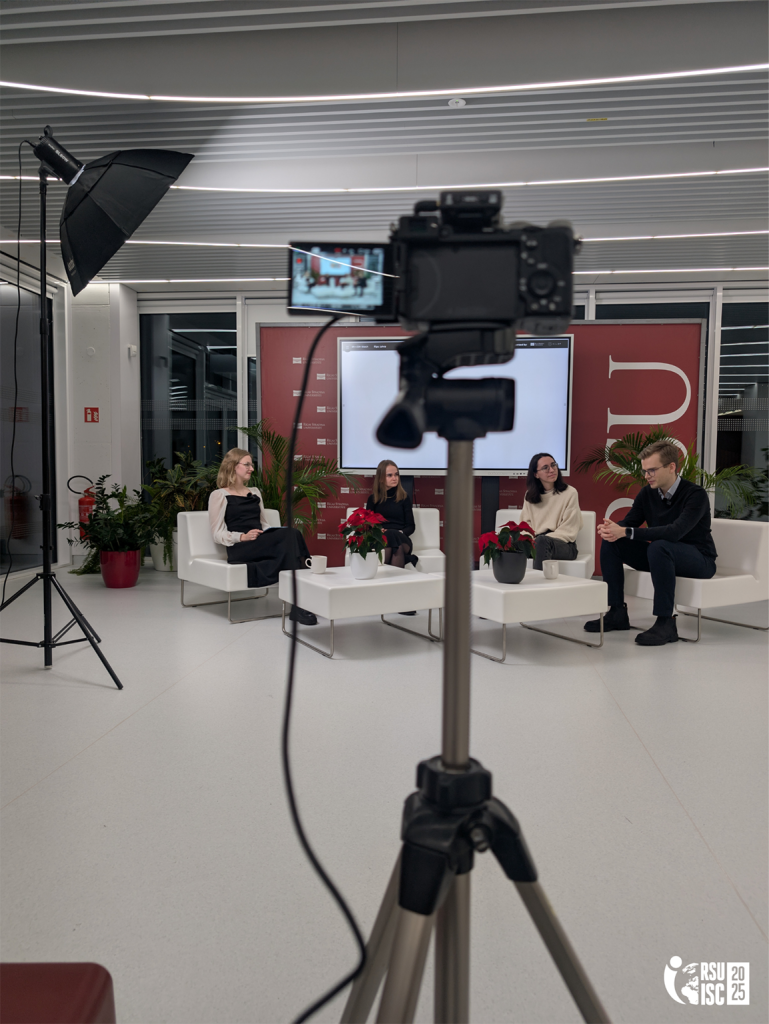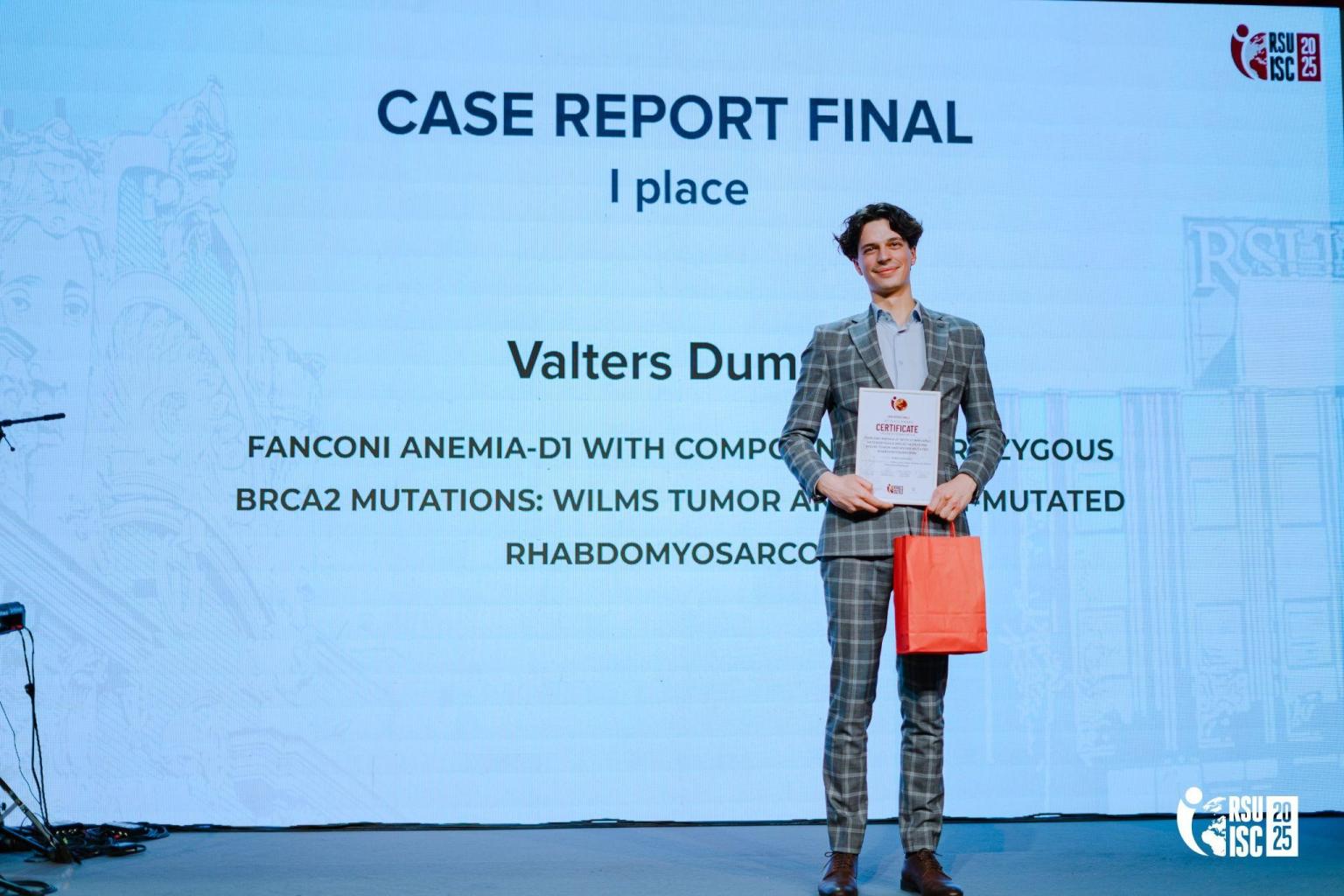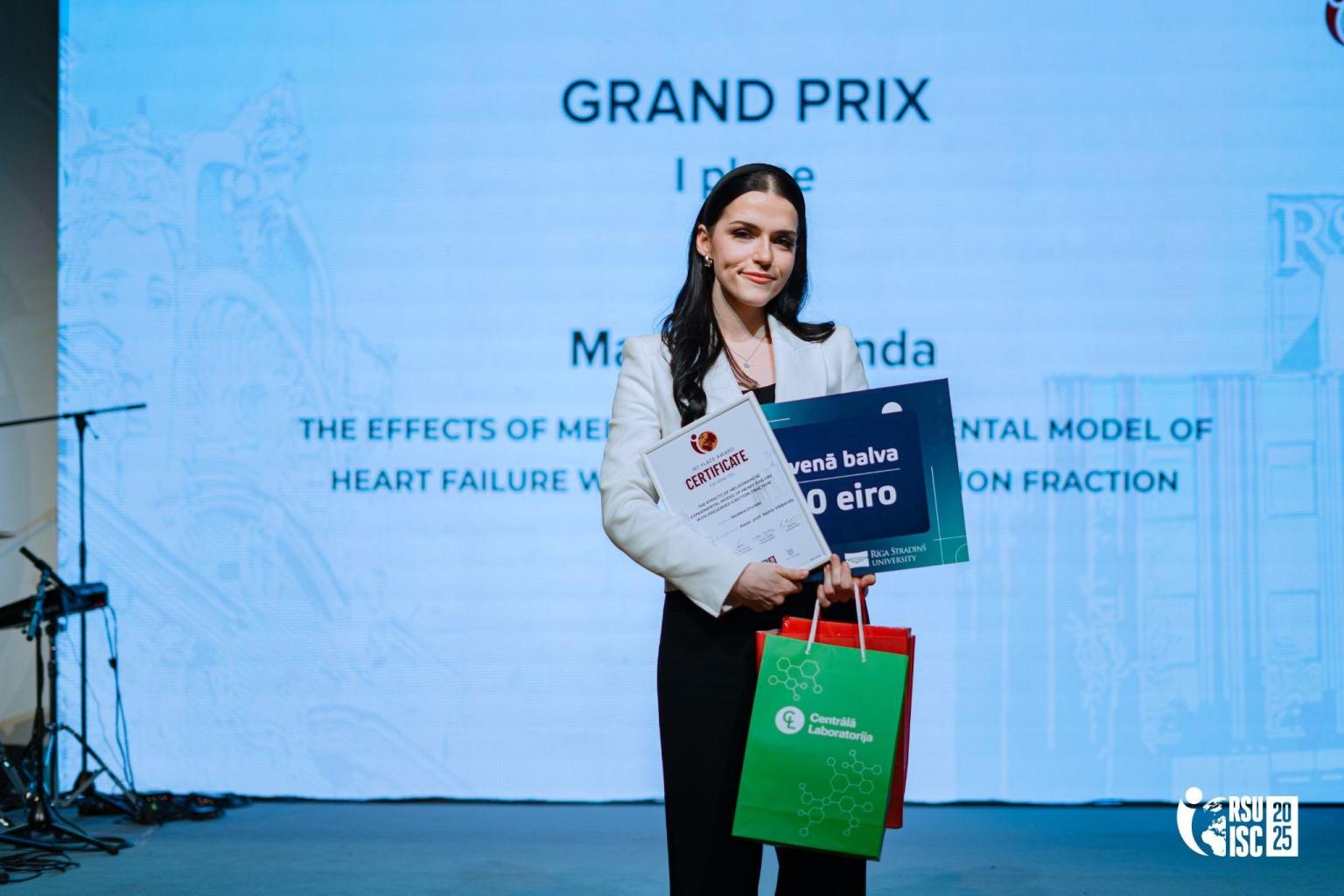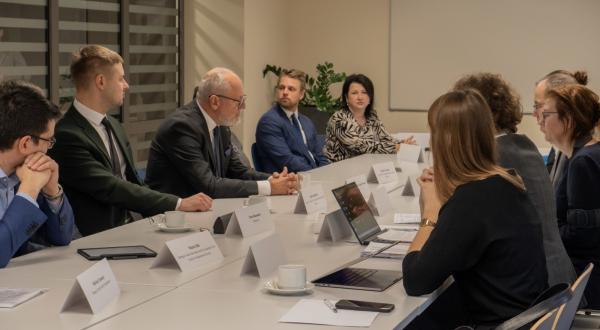Retrospective on the largest student conference at a local and international scale in 75 years
Rīga Stradiņš University (RSU) International Student Conference 2025 (ISC) breaks attendance records
RSU Research Week 2025 was traditionally opened by the RSU ISC 2025 in Health and Social Sciences on 24–25 March. This year marked the 11th time the conference was international, and it was organised under the auspices of RSU Student Union (Studējošo pašpārvalde, SP). In general, RSU students have been presenting their research for 75 years, with only the organiser and format of the conference changing over time. The aim of the conference is to support and promote student research, bringing together researchers from around the world, providing students with the opportunity to present their findings in both health and social sciences, discuss them with professionals in the field, and contribute to shaping the future scientific landscape.
This year, a record number of abstracts were submitted for the conference – 558 abstracts from 13 countries, the highest number ever received in the history of the ISC. The most represented countries were Latvia, Poland, Lithuania and the Czech Republic, while the highest number of abstracts were submitted in the surgery, internal medicine and the new sports science sections. After the abstracts were evaluated by local and international reviewers in each of the healthcare and social sciences sections of the conference, 475 authors were accepted for participation. 432 students presented their scientific work during the two days of ISC and they were evaluated by an international jury of 175 representatives from 15 countries. Research papers could be presented in a total of 39 sections, with 18 healthcare oral presentation sections, eight healthcare poster sections and 10 case study sections. Three social sciences sections were open to oral presentations of research. Although the conference was held in person, it could also be accessed remotely in a role of a passive participant or listener on the Mitto platform. More than 6,000 participants from 28 countries around the world registered for the conference.
The large number of participants is no coincidence, as over the past six months, the organising committee signed cooperation agreements with 10 other student conferences and congresses in Greece, Ireland, Poland, Italy, Portugal, Croatia and elsewhere. The organisers made several appearances on Latvian Radio, Television, including the station Radio Naba of the University of Latvia (UL), which resulted in an increase of participants from other Latvian universities.
RSU Research Week and ISC were both opened on 24 March with a special plenary session. RSU Rector Prof. Aigars Pētersons, and President of Latvia Edgars Rinkēvičs, welcomed participants in their opening speeches alongside and Laura Sabīne Taurmane, Chair of ISC Organising Committee. Following the opening, the event continued with inspiring and discussion-provoking presentations by Dr. Bertalan Meskó from Hungary, Prof. Romain Meeusen from Vrije Universiteit Brussel, and Prof. Susan Michie from the UK, while Agrita Kiopa, RSU Vice-Rector for Science, looked back at RSU's achievements in research, while Prof. Ivars Ījabs, Member of the European Parliament, highlighted the importance of science in Europe.
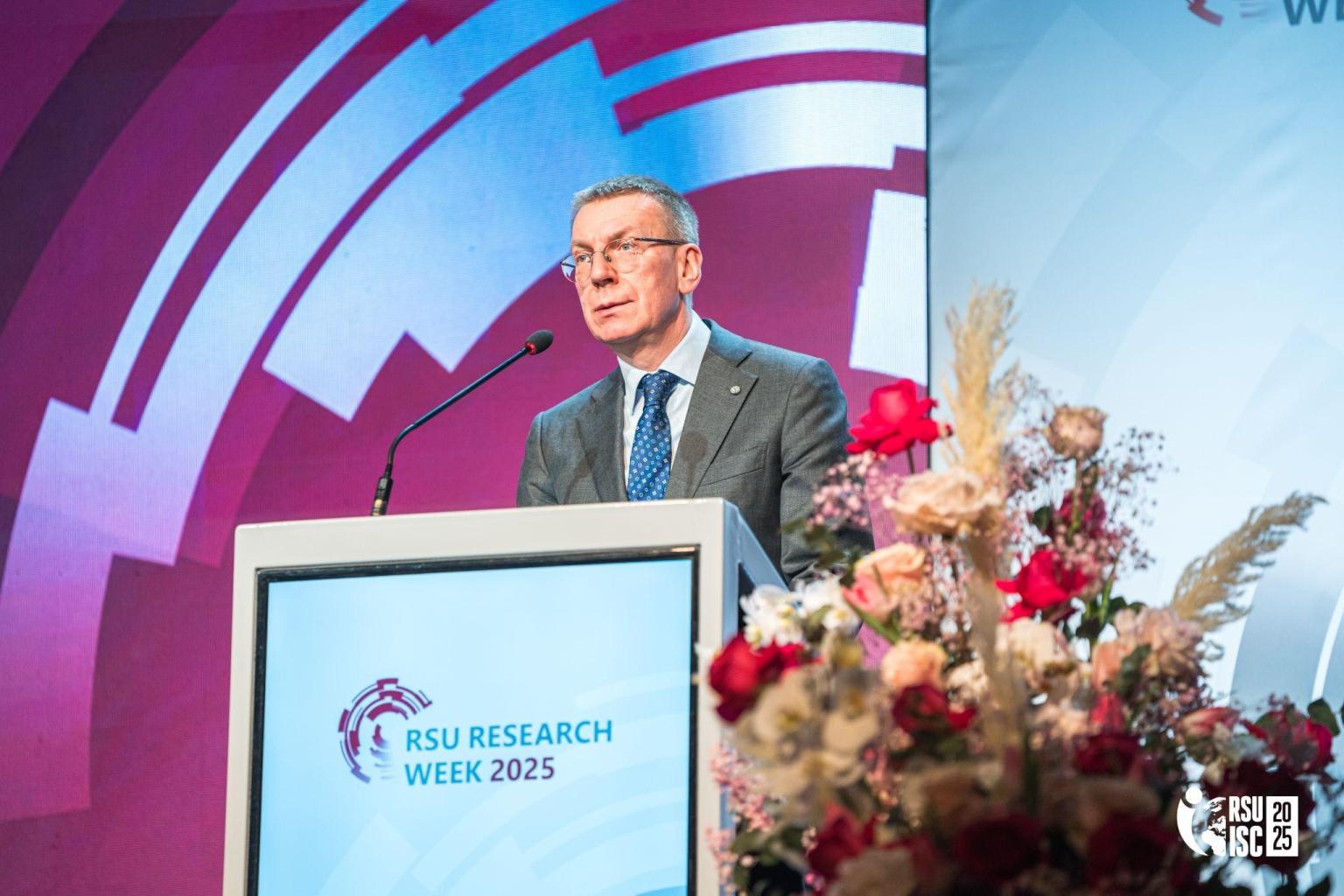
Latvian President Edgars Rinkēvičs delivers a speech during the RSU Research Week's opening plenary on 24 March. Photo by Rihards Slišāns
Following the plenary session, a number of other ISC activities and events started alongside the many science sessions. Four panel discussions were held in the RSU Great Hall on both days of the conference. In each discussion, students together with local and international experts critically examined national and international issues, analysing patterns and proposing solutions. How scientific achievements can reach society, medicine, and business, and how to expand research impact – this was the focus of the panel discussion ‘From research to real-world impact: making science matter’. This was followed by a panel discussion ‘The security situation in the Baltics: how to achieve a lasting peace in Ukraine and what will be the consequences?’, where the discussion centred on current issues related to the security challenges of the Baltics, in particular Latvia. 25 March began with insights on the integration of artificial intelligence in enhancing medical simulations in the panel discussion ‘Beyond the mannequin: the Role of simulation in modern medicine’. The panel discussion programme concluded with ‘Vaccination in the paediatric population’, where students together with professionals dispelled misinformation surrounding childhood vaccination.
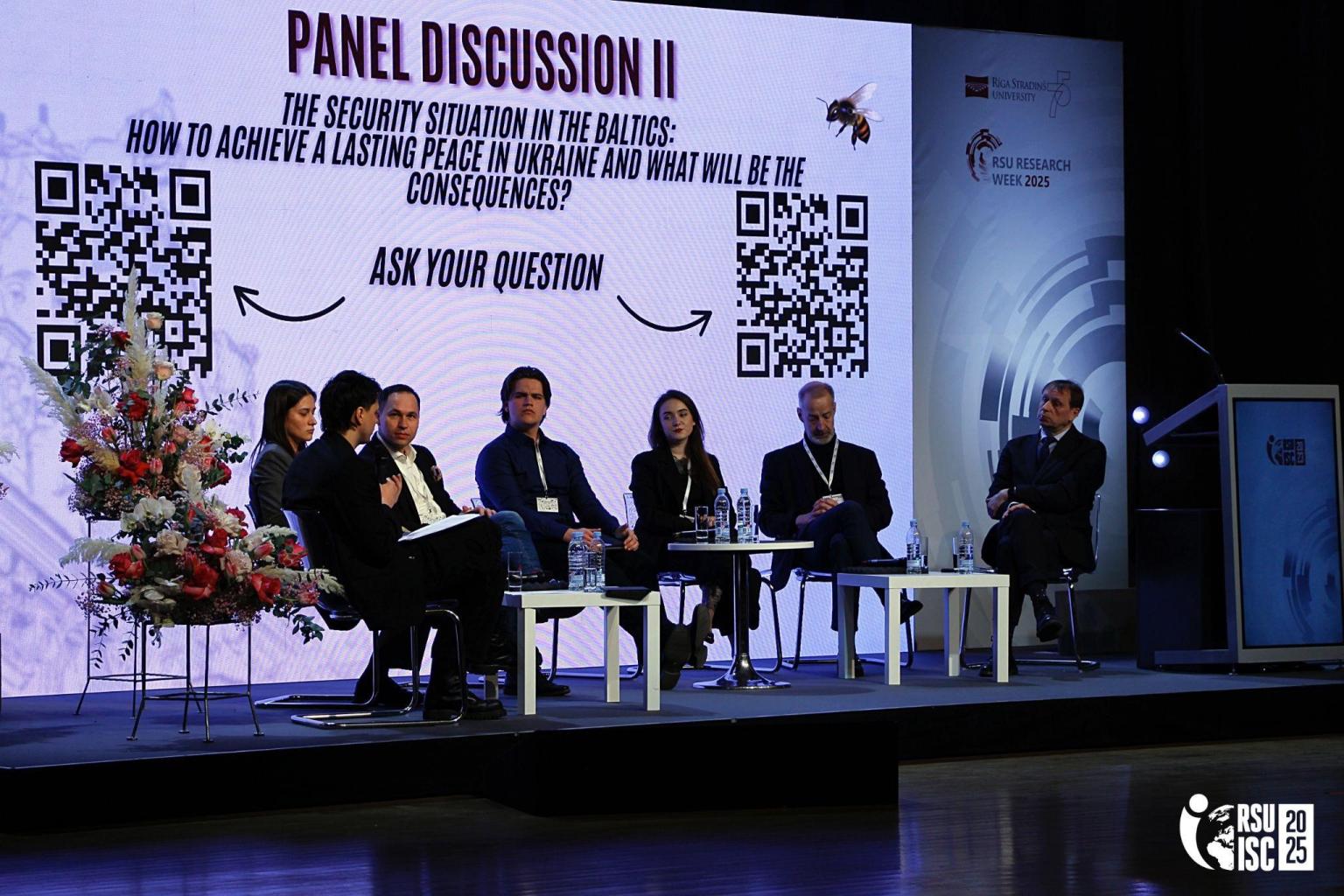
Discussion 'The security situation in the Baltics: how to achieve a lasting peace in Ukraine and what will be the consequences?' Photo by Laura Siņutkina
As part of ISC, on 24 March, under leadership of the RSU 6th year medical students Aleksandrs Oborins and Rihards Seržāns, the first Medical Wrestle simulation championship in the Baltics was held with participation of not only RSU local and international student teams, but also several teams from the UL, Estonia and Poland. A total of 10 teams took part in the qualifying rounds of the competition at 16 Dzirciema iela and 21 Konsula iela where they demonstrated their skills in prehospital and hospital emergency scenarios respectively. For an outstanding performance, the teams needed not only clinical knowledge and understanding but also excellent leadership, teamwork, and practical skills. In the closing or the final part of the competition, METC visitors and teams were greeted in the hall by parachutists entangled in a power line — a scenario that set the stage for an impressive and interactive demonstration of the polytrauma protocol prepared by the jury. After successful participation in qualifying simulations and passing the theoretical test, three teams competed for the medals in the final: the team ‘Baby Doctors’ from Poland led by Helena Żórawska (1st place), the RSU team ‘One+Four=14’ (2nd place) led by Artjoms Homenko and the team ‘LU-cas’ (3rd place) from the UL led by Vitālijs Kravčinskis.
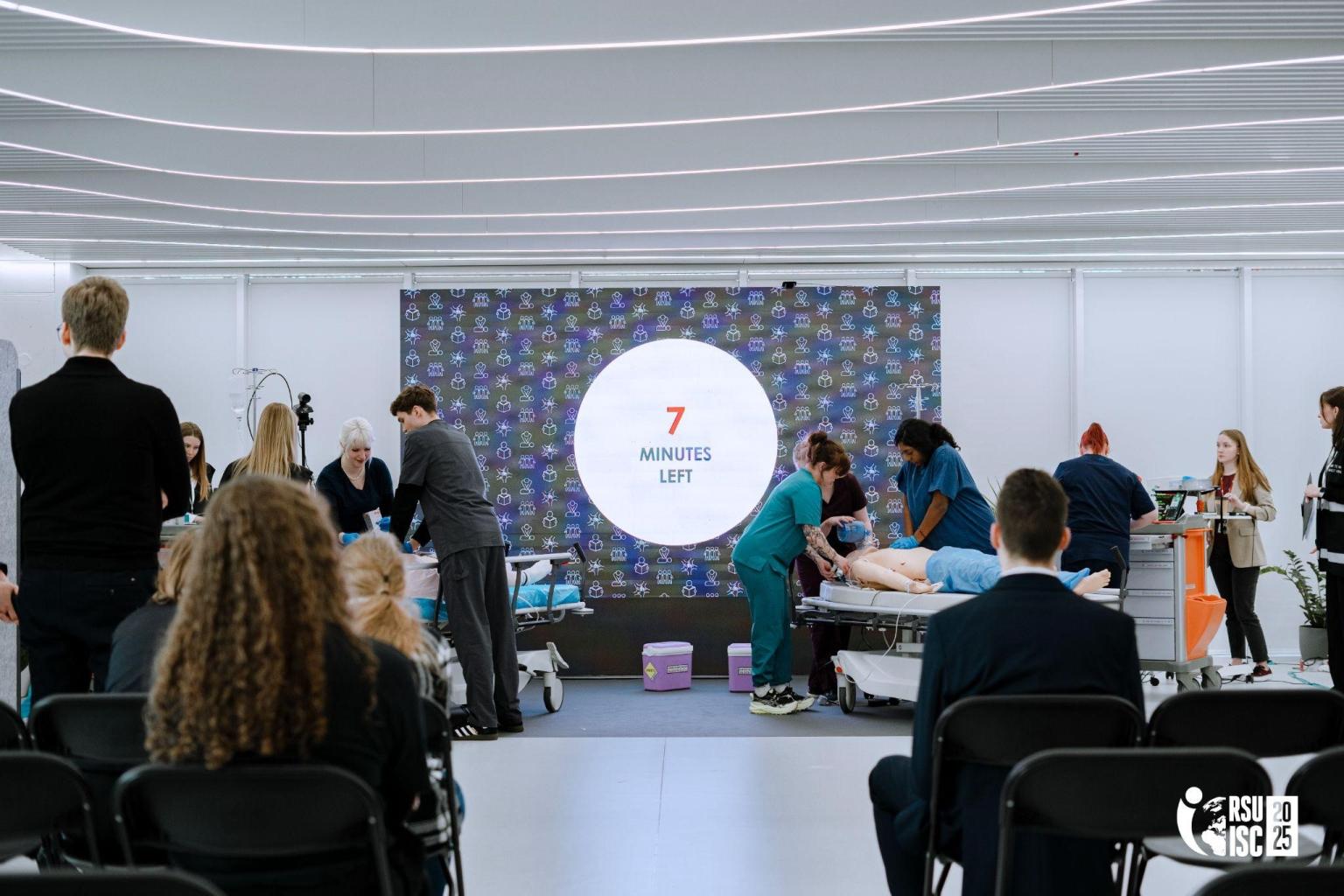
Medical Wrestle hospital scenario. Photo by Rihards Slišāns
The aim of the organisers this year was to make the conference programme engaging for dentistry students as well. As a result, the idea of holding a competition specifically for dentistry students was conceived last summer - bringing together students from different years and countries to solve real and challenging clinical cases commonly encountered in everyday dental practice. The main organiser of this year’s Crown It in Riga competition was Valters Vilis Zvaigzne, a fifth-year student at the Faculty of Dentistry. Under his leadership, ten competition stages were developed. The exciting event took place at the Institute of Stomatology and brought together nearly 40 students from five countries. First place was awarded to a team of second- and third-year students from the RSU Faculty of Dentistry: Megija Florentine, Rolāns Vozņesenskis, and Nikola Gavriļenko.
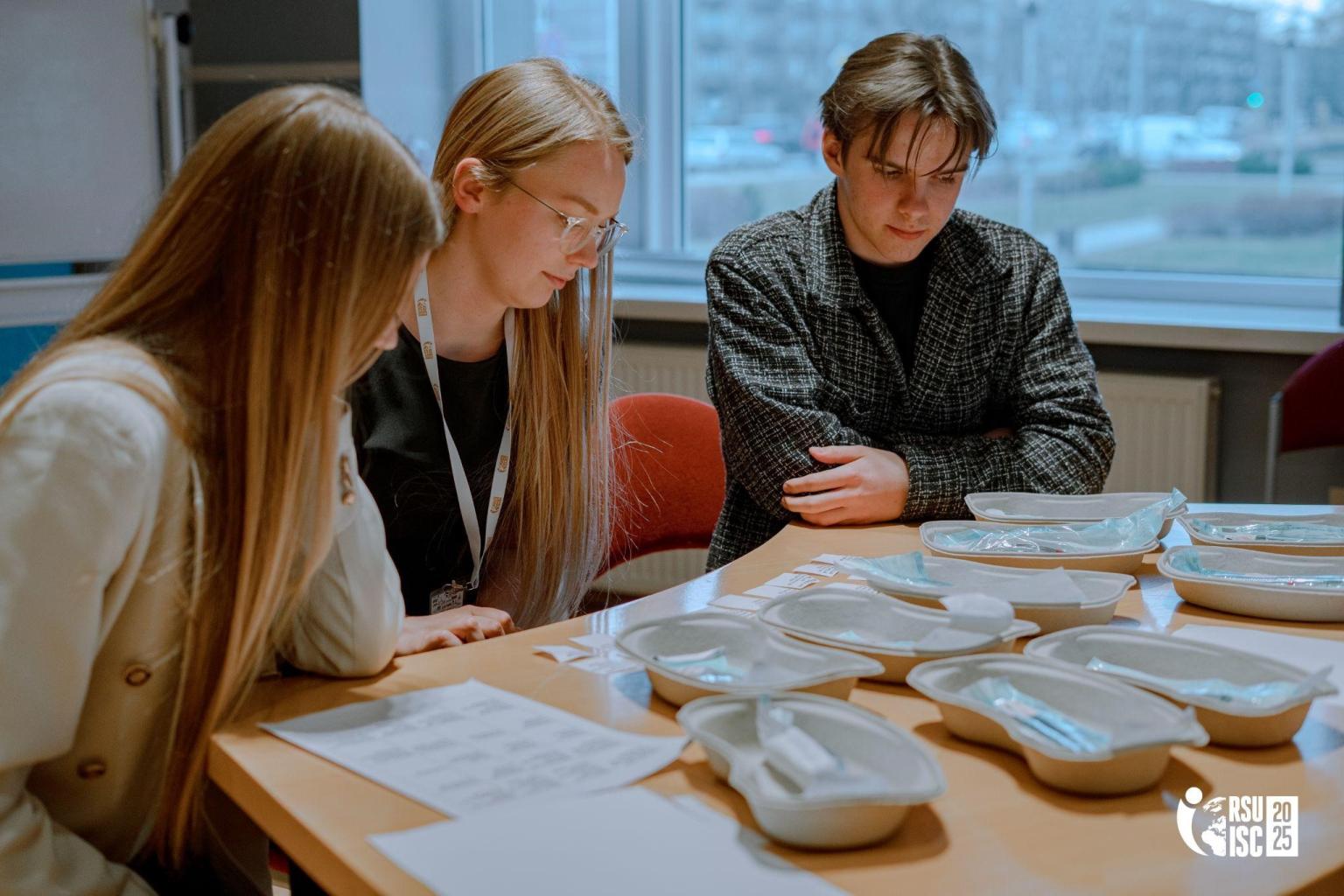
Dental student competition 'Crown It In Riga'. Photo by Rihards Slišāns
Thanks to the support of the leaders of student interest groups in medicine and health sciences, and the enthusiasm of the ISC organisers, a record number of practical workshops was held this year. Students had the opportunity to participate in 35 practical workshops, five of which were tailored to students of the social sciences. ISC remains the only student conference in Europe that consistently offers such a wide range of opportunities for students to develop practical skills. Those with an interest in social sciences and law had the chance to take part in moot courts and the United Nations Resolution Simulation Game, as well as to enhance their presentation and communication skills under the guidance of RSU lecturer Mārtiņš Daugulis. This year’s goal was to break down barriers between students of different fields—and it was indeed successful. For example, moot courts attracted medical students who were keen to learn more about legal proceedings, while several medical workshops were attended by students from the social sciences. This exchange highlights ISC’s role as an excellent platform for acquiring interdisciplinary knowledge beyond one’s core study programme. This year also marked the introduction of a new award for the most innovative workshop of ISC 2025. It was presented to the student whose idea and involvement in the organisation of a workshop made a particularly strong impression on the organisers. The award went to the workshop Advanced Techniques in Anterior Tooth Restoration, led by Darja Gostilo, leader of the dentistry student interest group.
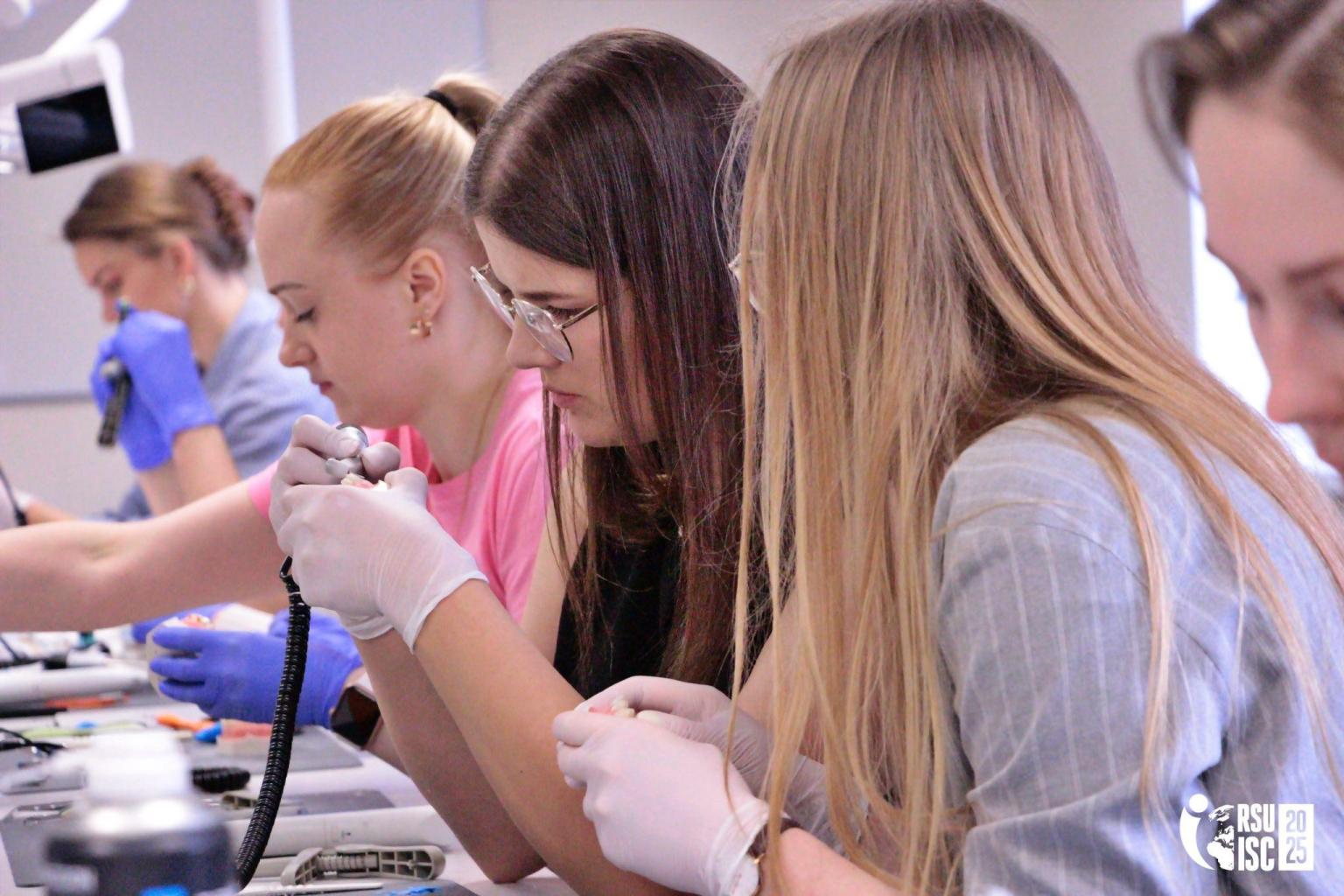
The Advanced Techniques in Anterior Tooth Restoration workshop. Photo by Laura Siņutkina
The conference featured a broad social programme. Both before and during the two days of ISC, students had the opportunity to join informative tours, enjoy the rhythms of Latvian folk dances together with the folk-dance ensemble Līgo, and build new connections and friendships at various networking events. This year’s visual identity for ISC highlighted Riga’s art nouveau architecture, reminding international lecturers and students of the city's global recognition in this area. As part of the social programme, participants could explore this unique architectural style on a guided tour of Riga’s most notable art nouveau districts. Another key symbol of ISC this year – uniting both student and academic communities – was the bee. It was also incorporated into the social programme. Participants had the opportunity to learn about urban beekeeping at Hotel Janne and discover the health benefits of honey. For the first time, participation in ISC was free of charge not only for RSU students, but also for all students from Ukraine. As a gesture of solidarity, attendees were invited throughout the two days to take part in creating camouflage nets for Ukrainian defenders, in collaboration with the organisation Tavi Draugi.
After a break of several years, the official podcast of the conference, ISC Talks, was relaunched this year. A total of six episodes brought together students, researchers, and experts to discuss current topics in science, innovation, and student research. Recorded in English, the episodes became a popular platform among students from other countries as well. The podcast is available on the official YouTube channel of the conference, as well as on Spotify and the ISC website.
The conference culminated on 25 March with the Grand Prix and Case Report Finals, where the first-place winners of each scientific section competed for the titles of Best Study and Best Clinical Case Report of the conference, as well as substantial cash prizes. First place in the Case Report Final was awarded to Valters Dumpis from Latvia for his clinical case report Fanconi Anaemia-D1 with Compound Heterozygous BRCA2 Mutations: Wilms Tumour and MYOD1-Mutated Rhabdomyosarcoma. The Grand Prix was awarded to Madara Grunda, also from Latvia, for her study The Effects of Meldonium in an Experimental Model of Heart Failure with Preserved Ejection Fraction. A full list of winners is available on the official ISC website.
The student organising team would like to extend their gratitude to all the supporters of this year’s project: the RSU Student Union, RSU Alumni Association, RSU Medical Education Technology Centre, JSC Veselības Centru Apvienība, Arbor Medical Corporation, Mēness aptieka, Centrālā laboratorija, Ardeline, Bellevue Park Hotel Riga, Egīla Gulbja laboratorija, Vidzemes slimnīca, World Latvian Youth Seminar 2x2, Society of Anaesthesiologists and Reanimatologists of Latvia, Latvian Association of Physicians and Dentists, Latvian Association of Healthcare and Management Professionals, Latvian Society of Cardiologists, Latvian Association of Human Genetics, Latvian Association of Gynaecologists and Obstetricians, Latvian Medical Association, Latvian Society of Occupational Physicians, Latvian Association of Surgeons, Latvian Institute of International Affairs, Latvian Association of Young Doctors, Latvian Dental Students Association, Latvian Beekeeping Society, Doctus magazine, Ir magazine, MyFitness, Curaprox, SIROWA Dental Clinic, Baltic Dialysis Centre, Ķīpsala Swimming Pool, Compendium Medicine, Philips Oral Healthcare, Oyakata, Gemoss, Venden, and many others. A full list of conference sponsors is available on the ISC website.
Thank you to all participants, jury members, lecturers, and sponsors! We look forward to seeing you again at RSU ISC 2026!
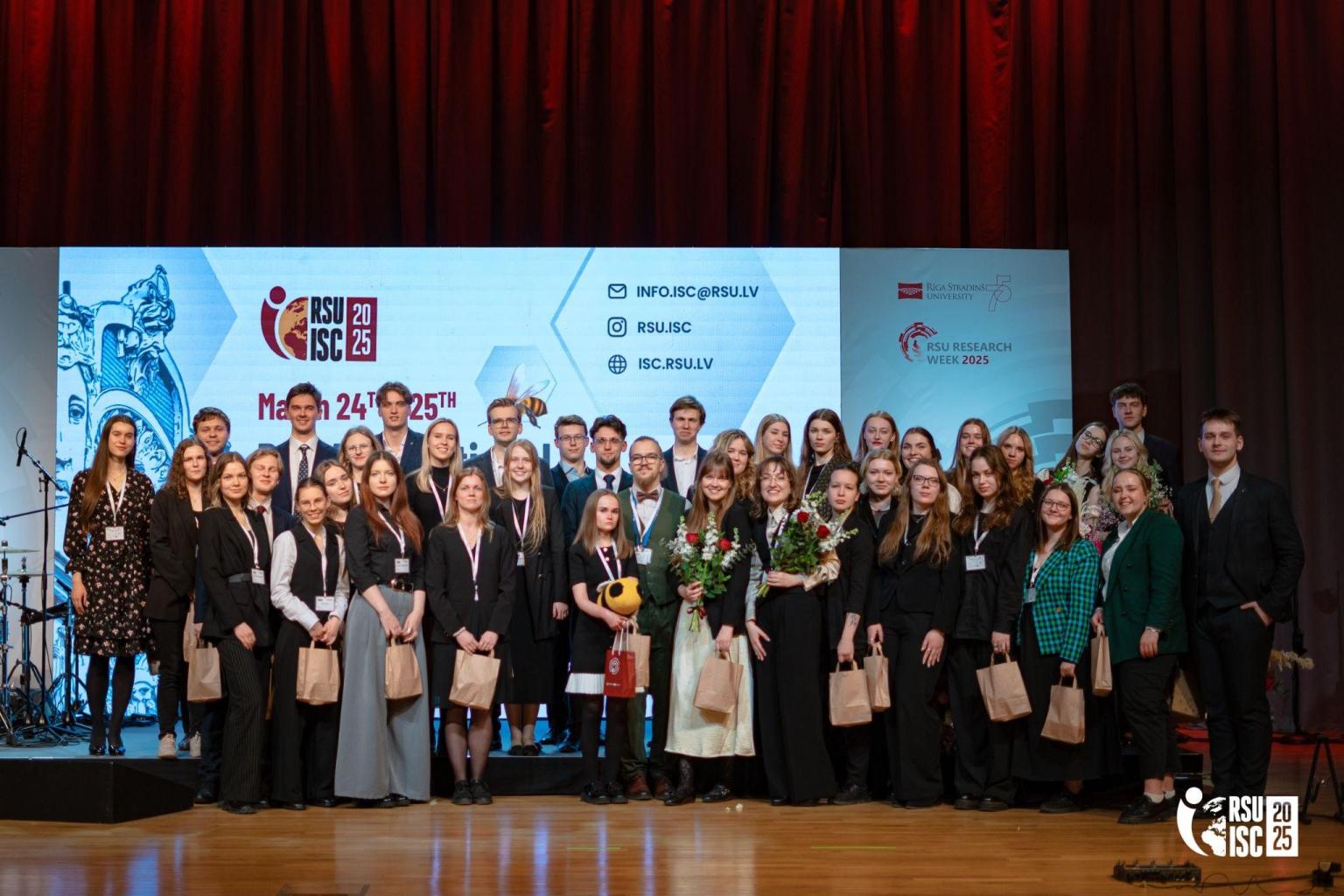
RSU ISC 2025 organising team after the closing of the conference 25 March. Photo by Rihards Slišāns
